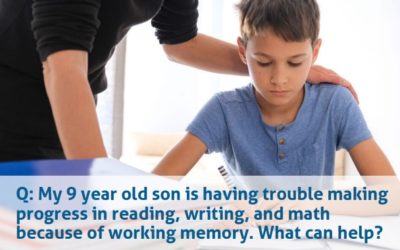Q: My 9 year old son is having trouble making progress in reading, writing, and Math because of working memory. What can help? Working memory is a type of memory that allows us to temporarily hold information 'in mind' to be used for other cognitive tasks. Some people...
Working Memory, Attention, and Learning [Premium]
“When we act on sensory inputs we call it ‘attention,’ but there’s a similar mechanism that can act on the thoughts we hold in mind.” — Timothy Buschman, Princeton University For the past 70 years, psychologists, researchers, teachers have focused intently on the implications of attention to learning, but working memory, a type of short-term memory that seems equally important — if not more significant — to general cognitive processes has received far less consideration. There are several implications for most dyslexic individuals because what many may attribute to attention or attention deficit may actually be due to activities involving working memory. IS IT INATTENTION OR WORKING MEMORY OVERLOAD? A student is struggling in math class. He is watching the teacher write on the board […]
Memory Problems and Math [Premium]
Many students and adults attribute difficulties in math to memory problems, but probing these difficulties further often leads to the realization that it’s not a simple matter of remembering or forgetting, but rather trouble defining, organizing, then retrieving what has been learned. PROBLEMS DEFINING AND UNDERSTANDING ‘WHY’ First of all, if a student is struggling with remembering new information, it’s best to check and see if the definitions, procedures, and the why of procedures are clear. In fact, it may be a flipside of a strength in long-term memory that contributes to dyslexic students’ confusion with ambiguous terms. A good example of this James Tanton’s blog post: When fractions are introduced as pieces of pie, 3/5 + 1/5 makes sense to equal 4/5, but what […]
The Power of the List [Premium]
For many of us, hearing about a new technology, app, or software can result in mixed feelings. We may have hope about better organizing and simplifying our lives, but also have reasonable worry about a difficult learning curve, a complicated interface, or any number of problems that can prevent us from reaping the benefits of whatever thing we are hoping might help. Enter – the simple list. If you have a weak short term or working memory, but great long-term memory and you don’t like reading lots of extra text, then lists may be the perfect productivity tool for you. Putting something down on a list can offload your working memory, but also have the benefits of reinforcing the big picture, while never losing sight […]
Getting Started: Dyslexic Cognition – Procrastination, Daydreaming, Working Memory Overload [Premium]
“What is the best way to start working if you’re dyslexic? It’s not always what you think. For parents supervising homework, the “starting to work” process for their students can look maddening. You may clear away distractions, put them at an empty dining table, make sure they have everything they need – then peek in an hour or even two later…and nothing has happened. They may be looking up at the ceiling, twiddling a pencil, or surfing on the internet. Is there a better way? Or maybe this is you as an adult. You know you have to do something, but you can’t seem to get started. Is it procrastination or something else? Without completely getting into the weeds of how the brain works, I […]
Daydreaming While Reading [Premium]
“There are certain half-dreaming moods of mind in which we naturally steal away from noise and glare, and seek some quiet haunt where we may indulge our reveries and build our air castles undisturbed.” – Washington Irving Daydreaming holds a curious position in the areas of science. On the one hand, daydreaming has been seen as a negative, associated with inattention and poor task persistence, but on the other, associated with creative behavior and personal inspiration. Neuroscientists have taken a renewed interest in daydreaming because daydream pathways activate the default mode network, a brain network that is now known to be important for reflecting on one’s self as well as others, remembering the past, and imagining the future. Studies of dyslexic and non-dyslexic people […]
Preparing with Templates and Posters [Premium]
When interviewing accomplished people of all sorts who are also dyslexic, there are some recurring themes – and one is, “I learned how to do the ‘dyslexic thing,’ you know, overprepare.” In some cases that means committing more hours to something – whether it was oral presentation or final project or job rotation. But often, it’s not just extra time spent; it’s also learning how to streamline certain repetitive features along the lines of “plan better” and not just “work more.” I was recently reminded of this when a social worker posted her work hacks for school and for work. One example is creating a template for her case notes: The template streamlines repetitive information that needs to be covered and reduces […]
Dyslexic Talents in STEM: Chemistry [Premium]
“Through most of high school, I hated math and science. It wasn’t until my senior year when I took AP statistics and AP chemistry that I discovered that I enjoyed solving challenging analytical problems. After I graduate in May, I plan to pursue a graduate degree in Electrical Engineering.” – Leah Harper Although chemistry may present dyslexic students with challenges, once the initial difficulty of notation and the periodic chart are mastered, the spatial and analytical aspects of chemistry can become life-long endeavors. In a video (that’s now unavailable on YouTube), Dr. Blake Charlton talked about how he discovered the narrative intelligence associated with dyslexia and how he used it to help him learn the periodic chart. Instead of memorizing columns of elements by […]
Managing Information with Concept Maps [Premium]
Although many people may use the terms “concept map” and “mind map” interchangeably, mind maps tend to be simpler, relating information to a central topic, whereas concept maps seek to cover more complex subjects, relating different parts to each other. Concept maps can be used to simplify material because different information can be grouped together and in the making of the map it can be easier to see how new knowledge builds on old. The process of making a concept map also transforms learning into an active process and students who are strong personal and experiential learners may remember the process better than reading through notes again and again. For students who say that they get lost in class, doing a concept map can help […]
Literary Analysis: Great Dyslexic Book Reviewers [Premium]
I’m always on the look out for dyslexic strengths and advantages presented in new ways and I couldn’t help notice these two popular dyslexic book reviewers on YouTube. It’s beautiful seeing what they’re doing and there’s definitely a lot of complicated strengths that are showcased in their entertaining videos. The first example here is Merphy Napier’s literary analysis of the complicated character of Severus Snape. What an example of going deep into literary analysis and theory of mind! No wonder it’s so hard for many book-loving dyslexics (yes, they exist) to answer short answer questions. They are thinking and processing about so much. I wonder if it makes many dyslexic writers novelists rather than short prose writers. There are many paradoxes about the dyslexic mind […]
Teaching Math – No Need for Speed
"What do teachers need to know about teaching math? Strategy over speed, and math thinking over rote memorization." - Stanford Professor Dr Jo Boaler Check out Jo's tips from her new article, Speed and Time Pressure Block Working Memory (below). "I was always deeply...
How Dyslexia Changes at Different Ages [Premium]
With all of the advances in our understanding of early intervention, dyslexia in older students and young adults often gets short shrift. The paper by Dr. Kathleen Niesen and colleagues has some interesting findings that have important points for identification, accommodations, and understanding of both the challenges and strengths of adolescents and young adults with dyslexia. Importantly, the authors made this point: “…if dyslexia was not diagnosed earlier in schooling, young adults do not qualify for accommodations even if as adolescents and adults they meet research criteria for dyslexia on evidence-based assessment. Such assessment practices do not seem fair or sensible or consistent with the spirit of the Americas for Disabilities legislation.” The point made was that dyslexia missed in the early grades usually meant dyslexia […]


![Working Memory, Attention, and Learning [Premium]](https://www.dyslexicadvantage.org/wp-content/uploads/2023/04/Working-Memory-Attention-and-Learning-7-e1680692445930-303x250.jpg)
![Memory Problems and Math [Premium]](https://www.dyslexicadvantage.org/wp-content/uploads/2023/02/Memory-Problems-and-Math-Premium-400x250.png)
![The Power of the List [Premium]](https://www.dyslexicadvantage.org/wp-content/uploads/2022/12/Power-of-List-Dyslexic-Advantage.jpg)
![Getting Started: Dyslexic Cognition – Procrastination, Daydreaming, Working Memory Overload [Premium]](https://www.dyslexicadvantage.org/wp-content/uploads/2022/11/Screen-Shot-2022-11-20-at-9.21.53-AM.png)
![Daydreaming While Reading [Premium]](https://www.dyslexicadvantage.org/wp-content/uploads/2021/08/daydream-400x250.jpg)
![Preparing with Templates and Posters [Premium]](https://www.dyslexicadvantage.org/wp-content/uploads/2021/08/Templates-2-400x250.jpg)
![Dyslexic Talents in STEM: Chemistry [Premium]](https://www.dyslexicadvantage.org/wp-content/uploads/2021/07/Chemistry-3-400x250.png)
![Managing Information with Concept Maps [Premium]](https://www.dyslexicadvantage.org/wp-content/uploads/2021/07/Concept-Map-400x250.jpg)
![Literary Analysis: Great Dyslexic Book Reviewers [Premium]](https://www.dyslexicadvantage.org/wp-content/uploads/2021/06/Book-Reviewers-400x250.png)














